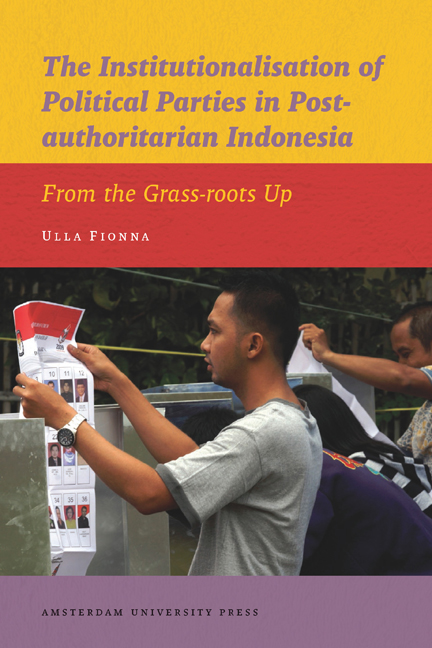 The Institutionalisation of Political Parties in Post-authoritarian Indonesia
The Institutionalisation of Political Parties in Post-authoritarian Indonesia Book contents
- Frontmatter
- Dedication
- Contents
- Preface
- Acknowledgements
- 1 The Question of Institutionalisation
- 2 Genesis of Modern Political Organisation in Indonesia
- 3 Diminishing Grass-roots Influence during the New Order
- 4 Party Organisation
- 5 Party Activities
- 6 Recruitment Approaches
- 7 Members’ Motivations and Participation in the Parties
- 8 Party Career and Intra-party Democracy
- 9 Progress of Party Institutionalisation and Its Role in Indonesia’s Democratisation
- Glossary
- Notes
- Bibliography
- Index
- Miscellaneous Endmatter
6 - Recruitment Approaches
Published online by Cambridge University Press: 28 January 2021
- Frontmatter
- Dedication
- Contents
- Preface
- Acknowledgements
- 1 The Question of Institutionalisation
- 2 Genesis of Modern Political Organisation in Indonesia
- 3 Diminishing Grass-roots Influence during the New Order
- 4 Party Organisation
- 5 Party Activities
- 6 Recruitment Approaches
- 7 Members’ Motivations and Participation in the Parties
- 8 Party Career and Intra-party Democracy
- 9 Progress of Party Institutionalisation and Its Role in Indonesia’s Democratisation
- Glossary
- Notes
- Bibliography
- Index
- Miscellaneous Endmatter
Summary
One indicator of the progress of the local organisation of political parties is recruitment. The degree of coherence between a party's national policy and its local application is of particular concern here, as it reflects a local branch's degree of organisation (Janda 1980) and the extent to which regulations issued by the party's central office are followed.
The Dynamics of Membership for Political Parties
Recruitment is widely regarded as an indication of party success (Klingemann & Fuchs 1995; Vanhanen 2000; Mair & van Biezen 2001). In his classic study of political parties, Duverger (1964) argues that parties can be differentiated by their emphases on recruitment. Traditional mass parties aim to expand their membership, while cadre parties rely on the quality of members to attract financiers. Although traditional parties are more focused on membership numbers than are cadre parties, grass-roots members play important roles in both. Duverger classifies grass-roots members according to their roles in a party, from the least to the most passionate and involved: ‘supporters’, ‘adherents’, ‘militants’ and ‘propagandists’ (1964: 61).
Yet grass-roots members are no longer featured widely in the modern literature on political parties (Burrell 1986: 48). Contemporary discussion of party recruitment is dominated instead by analyses of strategies for the recruitment of candidates for elections and public office. In the Handbook of Party Politics, Norris (2006) argues that recruitment is crucial for political parties as it is the means of ‘electing representatives at local and national level’, and for filling positions in important agencies such as ‘non-governmental organisations and government branches and federal agencies’. Her argument focuses on the destination of party recruits rather than their origins, and ignores the practices of grass-roots recruitment. Thus grass-roots recruitment is overshadowed in significance by the objective of placing recruits in public positions.
A political party's success as an organisation is, in fact, decided in large part by how successful it is in acquiring candidates who are able to offer choices to voters (Sanbonmatsu 2006: 233). Candidate recruit ment is a basic function of political parties, and a party that fails in this area ‘surrenders its elemental opportunity for power’ (Sanbonmatsu 2006: 234, citing Seligman).
- Type
- Chapter
- Information
- The Institutionalisation of Political Parties in Post-authoritarian IndonesiaFrom the Grass-roots Up, pp. 117 - 138Publisher: Amsterdam University PressPrint publication year: 2013


